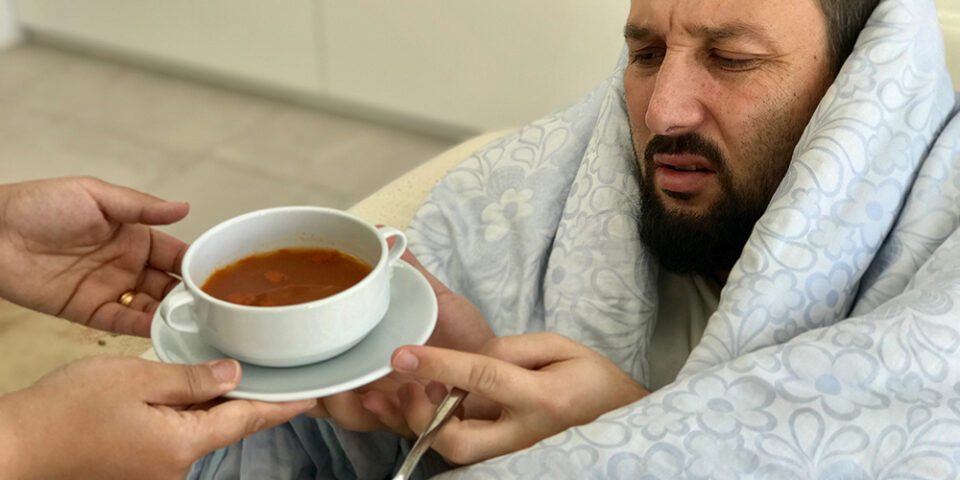How effective are traditional home remedies?
Feed a cold, starve a fever. Or is it starve a cold, feed a fever? We all have those traditional home remedies passed down from our parents, who heard it from their parents, who heard it from their parents … but how many of these ‘truisms’ about home remedies for common injuries or illnesses are true, and how many are false?
Kaci Mundhenke, FNP, answered our questions about which of these facts about traditional home remedies are true, and which are false.
True or false: Put hydrogen peroxide on a cut or scratch
“False! Although hydrogen peroxide is a common household antiseptic and is often the first product you reach for when cleaning minor wounds, it’s not a good idea to use it,” said Mundhenke.
Hydrogen peroxide can actually damage the skin tissue around the scratch, bug bite or cut and make the wound take longer to heal. Instead, rinse the wound thoroughly with water, wash with mild soap to promote wound healing and prevent infection and then cover with a bandage to protect it from further irritation.
True or false: Put butter on a burn
“False! Oh, butter is a genuinely awful choice to treat a burn,” said Mundhenke. “When it comes to burns at home, using something thick like butter or Vaseline actually traps the heat, making the burn worse and causing it to take longer to heal.”
Instead, focus on releasing that localized heat caused by the burn. Run the burn under cool water and bandage to protect the skin and seek medical treatment if it seems too severe to safely treat at home.
True or false: Don’t tip your head back during a nosebleed
“This one is very true,” said Mundhenke. “Don’t lie down or tilt your head back when dealing with a nosebleed. If you do, the blood will drain back down your throat or even potentially get into your lungs.”
Instead, Mundhenke suggests sitting down, leaning forward and pinching the soft area of your nose just below the bone. Hold pressure on the area for up to fifteen minutes or until the bleeding slows or stops. If the nosebleed continues, or reoccurs, seek medical treatment.
True or false: If someone is having a seizure, you should put something between their teeth
“False! Do not try to place or force an object into the mouth of a person having a seizure,” said Mundhenke. “Doing so could actually cause physical harm to the seizure victim, due to how the muscles lock up and become very rigid during a seizure.”
If you witness someone having a seizure, turn them onto their side, remove any nearby objects, call 911 and do not leave the victim until help arrives.
True or false: If someone has been poisoned, making them throw up will help
“False! Based on recommendations from the Poison Control Center, you should not attempt to induce vomiting for swallowed poisons at home, especially if the person is unconscious or seizing,” said Mundhenke.
If the swallowed substance is causing burning, irritation or is caustic and the patient is awake, alert and not convulsing or seizing, you can give them a small amount of water or milk. If any toxic substance is ingested, call Poison Control immediately at 1-800-222-1222. They can help you know what to do next.
True or false: You don’t need to starve or feed a cold OR a fever
“True! This is a pretty persistent myth passed down through the years, but there isn’t a lot of science to back up either assertion,” said Mundhenke. “Whether you have a fever or a cold, your body still requires adequate nutrition and hydration to heal and recover.”
The myth might come from the way appetite often decreases when sick, but to keep your immune system working most effectively, you still need to eat a balanced diet and give your body the support it needs. Stick to easy-to-digest foods if your stomach feels sensitive, such as broth, chicken noodle soup, or simple whole grains. Fruits and vegetables, both of which contain vitamins and nutrients that help support your immune system, can also go a long way.
True or false: A little vinegar can help to treat a sunburn
“False. There is no evidence to show that vinegar is remotely beneficial in treating sunburns,” said Mundhenke. “The acidity of the vinegar can actually cause skin irritation and inflammation to worsen, so the burn lasts longer or even appears more severe.”
Instead, use cool compresses, calamine lotion or aloe vera-based gels over mild or moderate sunburns. If you experience pain or inflammation, taking ibuprofen according to the package directions up to three times per day can help to lessen your discomfort.
Traditional home remedies aren’t all they’re cracked up to be
While the old wives’ tales we’ve grown up on may seem like common sense, many of the traditional home remedies for common injuries or illnesses can actually make the problem worse. Instead, stick to the simple steps that are most effective, and if you’re not sure what to do, call a medical provider for help.
Find the care you need, close to home
Our primary care physicians provide well visits and everyday care when you need it with compassion and expertise.
Find Primary Care Near You

